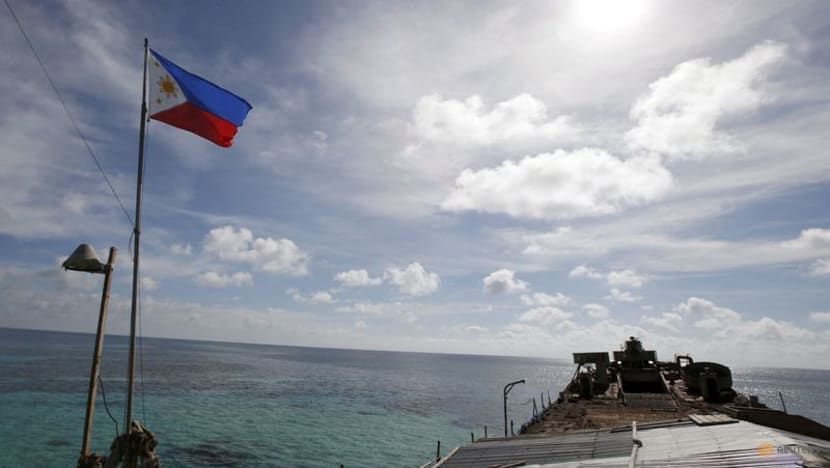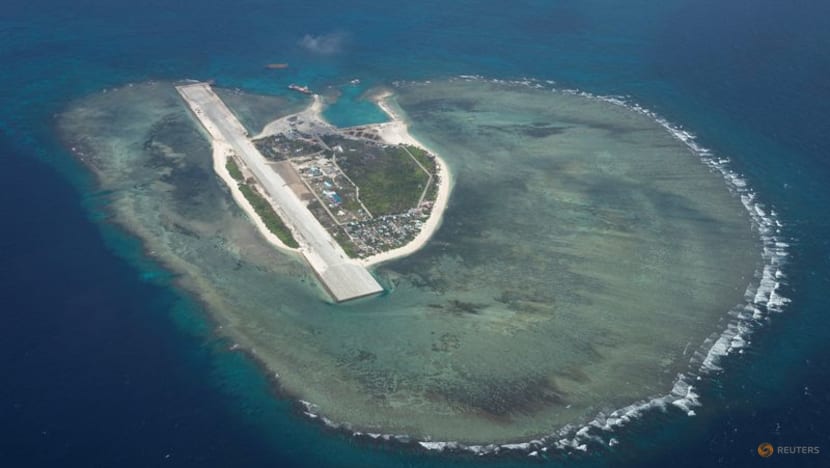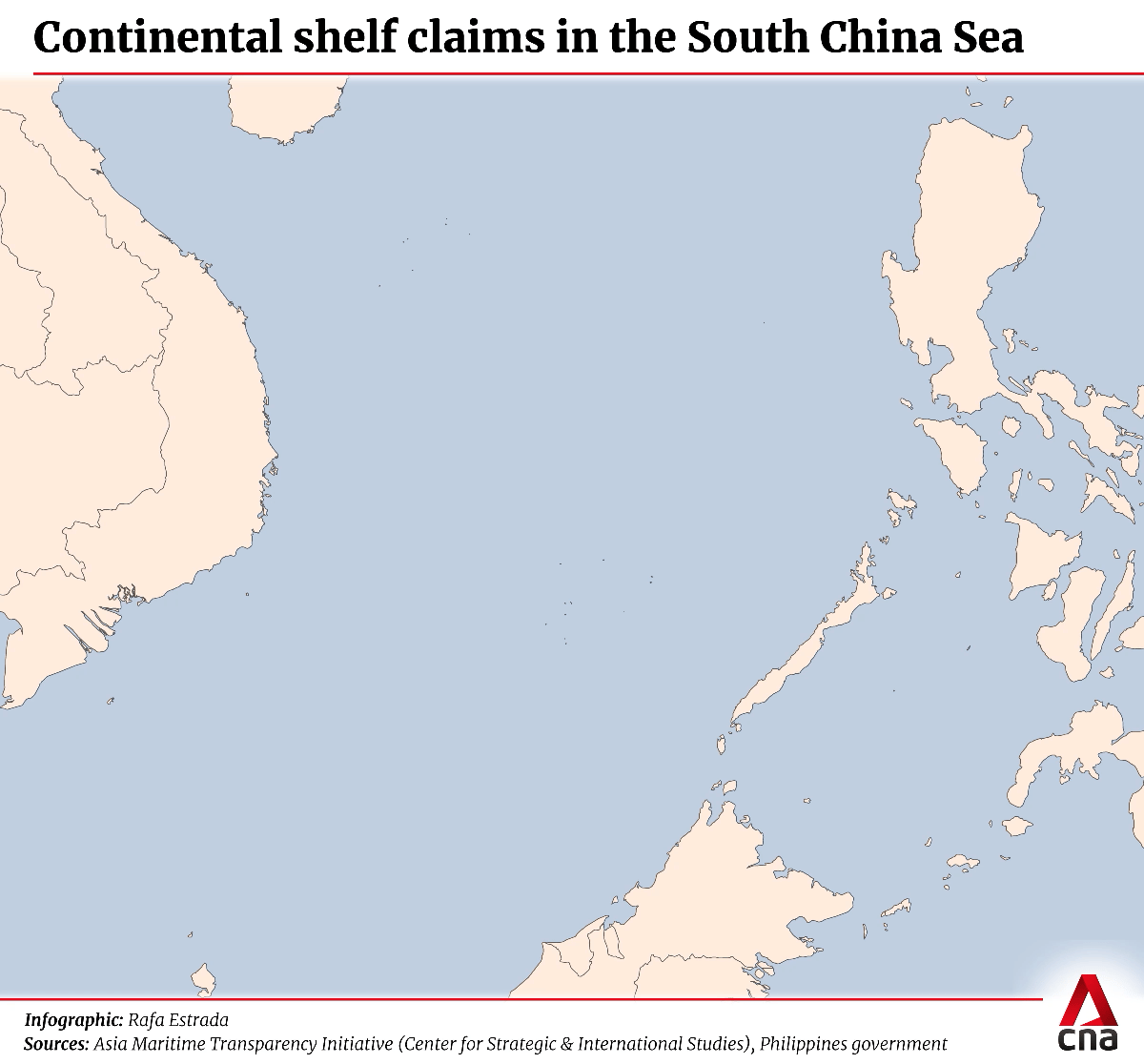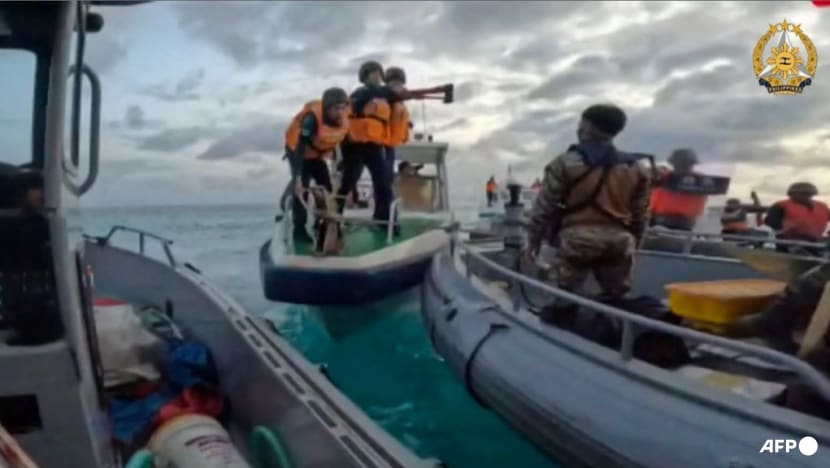‘Opportune’ timing: Why the Philippines is filing a seabed bid in the South China Sea, and the likely outcome
The Philippines is seeking recognition from the United Nations for its claim to an extended continental shelf to the west of Palawan, facing the South China Sea. But maritime law experts say the UN is unlikely to process the Philippines’ bid, let alone actively consider the claim.

A file photo of the derelict Philippine warship aground since 1999 on the disputed Second Thomas Shoal in the South China Sea. (Photo: Reuters/Erik De Castro)

This audio is generated by an AI tool.
SINGAPORE: The Philippines’ latest move to formally confirm the legal outer limits of its continental shelf in the disputed South China Sea has raised eyebrows as it has not only expectedly angered China but also even sparked concerns from Malaysia and Vietnam.
But analysts believe any blowback from fellow Southeast Asian nations is unlikely to escalate beyond stern words into punitive measures.
They say Manila would have already factored in its neighbours’ reactions when taking the step at the United Nations (UN) last month, as they note that its move is aimed at consolidating the country’s maritime interests amid heightened tensions in the contested waterway, particularly with China.
The Philippines also likely chose to act now after working on the submission for more than 15 years as the situation is “opportune”, said Dr Collin Koh, a senior fellow at the S Rajaratnam School of International Studies in Singapore.
“The current domestic climate makes it easier to push for new legislation … (also) this is probably one Philippine answer to what the Chinese are doing,” he told CNA.
But at the same time, Manila’s move presents challenges to its long-standing ally the United States, which has been jostling with China for regional influence.
If not handled properly, the choppy geopolitical waters in the contested seaway could boil over into conflict, analysts warn, especially with an increasingly assertive Beijing.
“The last thing they want is for something big to happen just because of the Philippines’ submission,” noted Dr Koh.
CLAIMING AN EXTENDED CONTINENTAL SHELF
The Philippines made a submission to the UN on Jun 15, seeking recognition for its claim to an extended continental shelf in the South China Sea, off the western island of Palawan, that covers the hotly-contested Spratly Islands.
Manila claimed it was entitled to “establish the outer limits of its continental shelf” up to 350 nautical miles, the maximum allowed under the UN Convention on the Law of the Sea (UNCLOS).
China has hit back with a diplomatic note of its own, calling on the UN not to review the Philippines’ submission and claiming that it seriously infringes China’s “sovereignty, sovereign rights and jurisdiction in the South China Sea”.

China claims almost all of the South China Sea as embodied in its so-called nine-dash line, although it has never precisely defined what it means. This assertion is at odds with the maritime claims of several Southeast Asian nations such as Malaysia, the Philippines and Vietnam.
According to UNCLOS - ratified by all Southeast Asian claimant states in the South China Sea, along with China - a coastal state exercises over its continental shelf “sovereign rights for the purpose of exploring it and exploiting its natural resources”.
Philippine authorities have publicly focused on the economic benefits to be reaped should the UN filing go through.
“The seabed and the subsoil … hold significant potential resources that will benefit our nation and our people for generations to come,” said foreign ministry assistant secretary for maritime and ocean affairs Marshall Louis Alferez on Jun 15. “Today we secure our future.”
The South China Sea holds an estimated 190 trillion cubic feet of natural gas and 11 billion barrels of oil in proved and probable reserves, according to the Center for Strategic and International Studies (CSIS). It’s also rich in fish, although overfishing has been a problem.
Dr Christian Schultheiss, a senior research fellow at Max Planck Institute for Comparative Public Law and International Law, said that in contrast to a country’s sovereignty over land, sovereign rights are “very limited”, including over maritime bodies.
“They do not encompass a coastal state’s right to regulate, for instance, commercial shipping or to reduce navigational rights,” he told CNA.
“In the extended continental shelf beyond 200 nautical miles, a coastal state does not even have the exclusive right to regulate fisheries. The water column above an extended continental shelf remains part of the high seas.”
“OPPORTUNE” TIMING FOR MANILA
The question is why now?
Philippine officials have said they worked on the UN submission for “over a decade and a half”, meaning from at least 2009 or earlier.
That year was when China submitted a map of its nine-dash line to the UN, in response to a joint submission by Malaysia and Vietnam claiming extended continental shelves in the southern part of the South China Sea.
Beijing’s move prompted a response from Manila that asserted its control over geological features in the Kalayaan Island Group, as well as the relevant maritime entitlements.
In 2009 as well, the Philippines submitted a similar claim to the UN over Benham Rise, an underwater plateau off its east coast not in dispute with China. The UN gave the nod three years on.
That the Philippines is choosing to lodge the filing now is no coincidence, analysts suggest.
RSIS’ Dr Koh said the domestic sentiment - warm with the US, cool with China - is a key factor.
This year’s regional survey by ISEAS-Yusof Ishak Institute found that over 83 per cent of respondents in the Philippines feel that the Association of Southeast Asian Nations (ASEAN) should align itself with the US rather than China if forced to pick a side.
Dr Koh pointed out a near-concurrent push for local legislation that aims to declare the rights and entitlements of the Philippines over its maritime zones.
Approved by the Philippine Senate in March, the Maritime Zones Act has come under fire from Beijing. At the time, a Chinese foreign ministry spokesperson described it as an attempt by Manila to “further enforce the illegal arbitral award on the South China Sea by domestic legislation”.
The spokesperson was referring to the landmark arbitration case in 2016 that largely invalidated China’s expansive claims in the South China Sea. Beijing does not accept or recognise the ruling and did not take part in the Philippine-initiated proceedings.
A top Philippine official said on Friday (Jul 12) that the Philippines will "stand our ground".
"We will ... push back against coercion, interference, malign influence and other tactics that seek to jeopardise our security and stability," Philippine National Security Adviser Eduardo Ano said at an event celebrating the eighth anniversary of the ruling by The Hague-based Permanent Court of Arbitration.
Another factor Dr Koh cited was how under President Ferdinand Marcos Jr, the Philippines has warmed up to the United States once again, a stark departure from his predecessor Rodrigo Duterte who sought closer relations with China as ties with Washington cooled.
“From a domestic standpoint, the enabling factors are there … it might not have been possible (previously), especially when Duterte was president,” he added.
Dr Koh also suggested that Manila’s latest move is linked to a possible second legal case against China, ever since the Southeast Asian nation ”basically won the 2016 arbitral proceedings”.
The Philippines said in September last year that it was weighing legal options against China for allegedly destroying coral reefs within its exclusive economic zone in the South China Sea. In late May this year, officials indicated that a formal complaint could be filed within weeks, reported the South China Morning Post (SCMP).
Manila also perceives China to be carrying out various grey zone tactics like lawfare, and the UN submission is likely its answer to what the Chinese are doing, Dr Koh said.
Similarly, Dr Andrea Chloe Wong, a non-resident research fellow at the Institute for Indo-Pacific Affairs, told CNA that the Philippines is making a strategic move to challenge China’s “excessive” maritime claims.
“(It is) also an important measure for it to protect its territorial integrity and maritime rights amid Chinese intrusions at sea,” she added.
MIXED REGIONAL RESPONSES
The Philippines’ move has been met with markedly different responses from several of its Southeast Asian neighbours.
Malaysia has come out swinging - submitting its own diplomatic note to the UN that “categorically” rejects Manila’s filing on the basis that the extended continental margin in the submission “was projected from the baselines of the Malaysian state of Sabah”, as reported by SCMP on Jul 4.
Malaysian Foreign Minister Mohamad Hasan confirmed on Jul 7 that a diplomatic note had been sent, reiterating the country’s sovereignty.
“The note by the Philippines stated that they took into consideration the maritime border runs through Sabah.
“This means they claim that Sabah is theirs … so we sent a protest note to the UN as the founding of Sabah, Sabah and Sarawak’s independence and the forming of Malaysia were done systematically and in an organised fashion, with all leaders agreeing and recognised by the UN,” he said.

Colonial-era pacts are at the heart of the historically complex dispute over Sabah, located on the northern tip of Borneo.
Putrajaya and Manila disagree over whether an agreement signed in 1878 between the Sulu Sultan, who owned Sabah at the time, and the British North Borneo Company was a lease or a cession. The Philippines sees it as the former, Malaysia interprets it as the latter.
The dispute has persisted through the years, flaring up occasionally through diplomatic notes, legal action and even armed incursions.
Despite Malaysia’s vocal protests, analysts don’t expect the unhappiness to spill over into punitive measures.
“While they are still maintaining their position on the various territorial disputes, including in the South China Sea, Malaysia’s current emphasis now is economic recovery and development,” RSIS’ Dr Koh said.
“I don’t think the Anwar government unnecessarily wants another front with the Philippines … it’s largely going to be a waste of time.”
Like Malaysia, Vietnam has also reacted, although more amicably. Hanoi said on Jun 21 that it is willing to talk with Manila to seek measures in line with both their interests, a position the Philippines has welcomed.
Similarly, analysts don’t expect Vietnam to raise a ruckus as the economy is its primary concern. Even if there are disagreements, Hanoi is expected to voice them privately, in line with the country’s long-standing practice.
A likely reason is that Vietnam doesn’t want any sign of discord within ASEAN considering that the regional grouping is a cornerstone of its foreign policy, Dr Koh noted.
“If there is intra-ASEAN discord, then it may not work in Vietnam’s favour in the South China Sea … Vietnam is likely mindful that China is watching how it deals with other parties,” he said.
The Philippines has said its submission to the UN does not prejudice discussions with relevant coastal states that may have legitimate extended continental shelf claims under UNCLOS.
“We consider our submission as a step in discussing delimitation matters and other forms of cooperation moving forward. What is important is the Philippines puts on record the maximum extent of our entitlement,” said Mr Alferez on Jun 15.
Either way, the Philippines would have already factored in its neighbours’ reactions when deciding to make the UN submission, analysts note. They would also have had little bearing on Manila’s decision considering how ASEAN nations responded in 2012 and 2013, suggested Dr Koh.
In 2012, China seized Scarborough Shoal - which falls within the Philippines’ EEZ - after a standoff with Manila and has since maintained a constant deployment of coastguard and fishing trawlers. In 2013, the Philippines initiated arbitral proceedings against Beijing.
“When the Philippines saw themselves as standing up against China, none of the ASEAN member states spoke up. Vietnam only made a generic statement, but not calling out China,” Dr Koh said, referring to the 2012 event.
ASEAN reacted similarly one year on, he added. “ASEAN didn’t make any statement, and there were even those in ASEAN who believed that the Philippines was reckless in lodging a legal case against China.”
The eventual ruling in 2016 ended up benefiting not just the Philippines but other ASEAN states as well, as evidenced by what they did in 2020 and 2021 amid several South China Sea incidents revolving around China, noted Dr Koh.
“There was Indonesia, Malaysia, Vietnam issuing note verbales to the UN and citing the 2016 arbitral award against China,” said Dr Koh. A note verbale is a type of diplomatic communication, unsigned and written in the third person.
“So can you imagine if you’re the Philippines? 2013, you get no support. And at the end when the arbitral award came out, it benefited more than just the Philippines, and the others - just sitting there and enjoying the fruits of the labour.”
“COMPLEX, TRIANGULAR RELATIONSHIP”
Manila’s latest move also stirs up choppy waters for the United States to navigate, especially as it tussles for regional influence with an increasingly assertive China amid a wider rivalry tinged by American accusations of overcapacity and counterclaims of containment.
Analysts agree that Washington is certain to back the Philippines, considering their longstanding alliance and the China factor. Under the Mutual Defence Treaty signed in 1951, both sides are required to support each other in the event either is attacked. An attack on one party is also deemed as an attack on the other.
But the US will not want to risk conditions in the South China Sea getting so hot that it boils over into conflict, said Dr Koh from RSIS. He noted the Jun 17 clash between Manila and Beijing in the disputed Second Thomas Shoal.
Chinese coast guard sailors brandished knives and other melee weapons while a Filipino sailor lost a thumb in the encounter - the most severe in a series of confrontations over Manila’s resupply missions to a derelict warship atop the contested reef.

There’s been a rising chorus in the wake of the incident, especially within the Philippines, for the US to demonstrate its ability to be a reliable treaty ally, said Dr Koh.
“Some of them were hoping that the US would provide more tangible support, including military action against China. Not necessarily to strike China with force, but at least show much more than just conducting joint exercises. So because of that, I think the US has been coming under pressure.”
At the same time, Washington is clear-eyed that if the Philippines pushes its extended continental shelf claim, there is a real possibility of Chinese action, observers say.
“For the Chinese government, such a move is an outright challenge to its sweeping nine-dash line on a supposed historical basis,” said Dr Wong from the Institute for Indo-Pacific Affairs.
There was speculation that China was using the Jun 17 incident to express its displeasure towards the Philippines, said Dr Koh, pointing out that it took place just two days after Manila submitted its UN claim.
“So this is a tricky issue for the US because, on the one hand, you have to show yourself as a reliable ally by supporting this legal endeavour. At the same time, you have to manage the situation.
“This is a very complex, triangular relationship between the US, Philippines and China.”
HURDLES TO THE PHILIPPINES’ CLAIM
All that being said, maritime law experts highlight that the UN is unlikely to process the Philippines’ extended continental shelf submission, let alone actively consider the claim.
The crux is that there are countries - in this case, China and Malaysia - which have requested for the UN not to do so.
“As the CLCS does not make recommendations about submissions that concern disputed areas, the CLCS is unlikely to recommend the limits the Philippines is seeking,” said Dr Schultheiss, referring to the UN Commission on the Limits of the Continental Shelf that oversees such matters.
He explained that while the Philippines might be able to make a case against China’s objection by citing the 2016 arbitration ruling, Malaysia’s protest complicates matters as its rejection is due to Manila’s claim being “projected using baselines from Malaysia’s Sabah”.
“The Philippines’ submission can therefore be considered as the Philippines upholding its claim to territorial sovereignty over Sabah,” Dr Schultheiss noted.
“Therefore, the question of whether the arbitral award of 2016 potentially clears the way for the CLCS to consider the Philippines’ extended continental shelf submission is unlikely to reach the agenda or active consideration of the CLCS.
“This is thus an example of how unresolved disputes between two ASEAN members hamper their dealings with China in the South China Sea.”


















